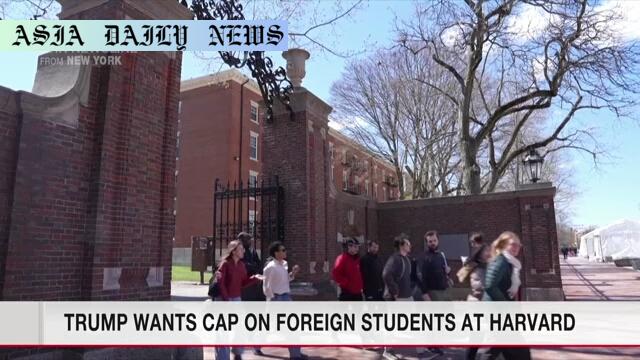Harvard faces drastic federal funding cuts as Trump administration pushes for a reduction in international students.
Trump administration aims to terminate Harvard’s $100M federal contracts.
Trump criticizes international students, suggesting a 15% cap.
Administration explores revoking Harvard’s tax-exempt status.

Trump Targets Harvard’s Federal Contracts
Recent developments indicate that US President Donald Trump has intensified his criticism of Harvard University, unveiling plans to end significant federal contracts valued at approximately $100 million. This move comes amid heightened tensions between the Trump administration and the Ivy League institution. According to multiple reports, including The New York Times and Reuters, the administration has already instructed federal agencies to reassess their agreements with Harvard and devise plans to cancel these contracts by June 6. These contracts encompass various areas, including executive training for the Department of Homeland Security, drawing attention to the broad impact of such cancellations. This decision reflects the administration’s wider strategy to challenge establishments it perceives as indifferent to its priorities, highlighting deeper political and ideological divisions.
Restrictions on International Students
In addition to financial constraints, President Trump has called for significant reductions in the number of international students attending Harvard. Currently, international students account for roughly 30 percent of the university’s student body, totaling around 6,800 individuals. Trump has proposed that this figure be capped at 15 percent, stating that foreign nationals take up opportunities that could benefit American students. His remarks, including statements suggesting foreign students do not contribute positively to the United States, have drawn sharp criticism. The president’s rhetoric emphasizes a nationalistic approach to education, favoring domestic applicants over international students, whom he believes should exhibit loyalty and a love for the country. Such measures could have severe implications for the institution’s global reputation and diversity.
Revoking Tax-Exempt Status and Broader Implications
Another controversial aspect of the administration’s stance against Harvard includes plans to revoke the university’s tax-exempt status. This unprecedented move could result in significant financial burdens for the institution, which relies on diverse funding streams, including federal support. Critics argue that these measures are politically motivated and retaliatory, given the perceived ideological leanings of academic institutions like Harvard. The combined effects of reduced federal contracts, restrictions on international enrollment, and potential tax obligations could disrupt Harvard’s financial stability, endanger student services, and undermine its standing as a global educational leader. These developments reflect broader debates about education funding, immigration, and national priorities in the United States.
Analysis of Policy Outcomes
While the administration’s policy on Harvard targets one institution, the implications extend far beyond its gates. Federal contracts and international student programs are vital components of higher education in the US, contributing to innovation, diversity, and economic growth. The measures proposed by the Trump administration could have lasting repercussions, discouraging other universities from pursuing federal partnerships or attracting international talent. Additionally, such actions risk exacerbating tensions between the government and academic communities, ultimately diminishing the country’s global educational influence. Stakeholders must carefully consider the broader impacts of these policies to preserve the long-term value of education as a cornerstone of societal progress.
Commentary
The Impact of Trump’s Actions on Higher Education
The proposed termination of Harvard’s federal contracts by the Trump administration shines a spotlight on the intersection of politics, education, and national priorities. Harvard, a globally renowned institution, depends on substantial federal funding for research, training, and innovation. Cutting these contracts would not only impact the university itself but also have ripple effects across the academic, scientific, and professional communities. The administration’s decision seems to underscore an intent to assert control, but it raises questions about whether such drastic measures truly align with broader national interests.
Addressing International Diversity
One of the most contentious aspects of Trump’s plan revolves around international students at Harvard. The suggestion that their presence may reduce opportunities for American students poses a flawed argument, overlooking the immense cultural and economic contributions that international learners bring to the US. Limiting their enrollment sends a restrictive message, potentially deterring talented minds from pursuing education in America. This approach not only narrows the intellectual diversity at reputable institutions like Harvard but also harms the country’s reputation as a global leader in education and innovation. Welcoming international students has long been an integral part of American higher education, fostering a rich exchange of ideas and perspectives.
Long-Term Consequences and Need for Dialogue
While the Trump administration’s decisions may resonate with certain political constituencies, the long-term consequences of such actions cannot be ignored. Targeting a single university with punitive measures risks undermining trust between the federal government and educational institutions. Furthermore, efforts to restrict funding and enrollment diversity may set a dangerous precedent, leading to diminished academic freedom and global competitiveness. A more balanced, collaborative approach is necessary to address legitimate concerns without jeopardizing the critical role universities play in driving innovation and fostering talent on an international scale. Thoughtful dialogue and mutual understanding between stakeholders are essential for ensuring that higher education remains a source of strength for the nation.


